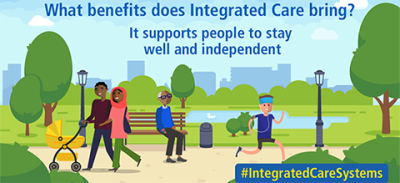ICSs will work together to provide high quality services and benefit local people as much as possible

There have been significant improvements in the NHS and social care over the past few years, but there are major challenges ahead. Life expectancy varies across England. People are living longer, but not always healthier, lives. There are more frail elderly people with complex needs and more children, young people and adults with mental health challenges.
The challenge is significant.
On 1 July 2022, the way health and care services are planned, paid for and delivered is changing to better meet our changing health and care needs.
Across England, local partnerships called Integrated Care Systems (ICS), made up of all the public services that provide health and care – the NHS, GPs, local councils and the community, voluntary and social enterprise sector – will work together to provide high quality services and benefit local people as much as possible.
ICSs build on many years of collaborative working between health and care organisations. They work to improve the health of their population, helping more people stay healthy and taking better care of those who are not. They will improve the quality of care, including enabling patients to better manage their own conditions at home, tell their story once, improve outcomes and patient experience.
ICSs will deliver care more efficiently, avoiding duplication and needless visits to hospital but ensure those who do need to go to hospital can benefit equally from the same high standards of specialist care.
Read the full NHS England announcement here: NHS England » NHS checks and treatment on patients’ doorsteps part of new changes to health and care in England.
Read about the North East and North Cumbria ICS and the chief executive Samantha Allan here: ICB kick-starts plans to support communities to live happier and healthier lives | North East and North Cumbria (northeastnorthcumbria.nhs.uk).
